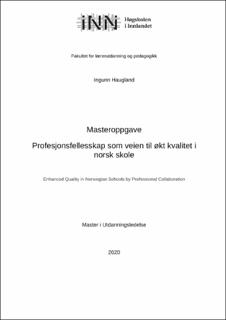Profesjonsfellesskap som veien til økt kvalitet i norsk skole
Abstract
Norsk:
Denne oppgaven består av tre artikler. Artiklene belyser fra ulike vinkler i hvilken grad norsk skole er på vei mot å utvikle profesjonsfellesskap som beskrevet i Overordnet del – verdier og prinsipper for grunnopplæring kapittel 3.5.
Den første artikkelen tar for seg lærerperspektivet. Det er en kvalitativ studie som undersøker i hvilken grad lærere på ungdomstrinnet og småtrinnet opplever sitt kollegium som et profesjonelt læringsfellesskap. Et av funnene er at lærere på småtrinnet baserer seg i større grad på felles praksis, mens på ungdomstrinnet står den enkelte lærers autonomi sterkere.
De to andre artiklene tar utgangspunkt i ledelsesperspektivet. Artikkel to handler om regeletterlevelse og undersøker i hvilken grad intensjonene bak lovendringene i Opplæringsloven kapittel 9 A blir oppfylt i praksis i norske skoler. Artikkelen er en kvalitativ studie og baserer seg på intervjuer med rådgivere hos fylkesmannen og rektorer. Studien finner mellom annet at barnekonvensjonen bare delvis er implementert i arbeidet med skolemiljøsaker på skolene. Rektorene har fått en økt arbeidsbelastning og krav til mellom annet juridisk kompetanse uten at det er lagt godt nok til rette for støtte og profesjonsfaglig fellesskap. Særlig viser studien at det er behov for kompetanseheving hos rektorene knytt til undersøkelsesplikten.
Artikkel tre er en teoretisk drøfting. Artikkelen drøfter hvilke ledelsesstrategier og prinsipper som vil støtte skoleledelsen i innføringen av læreplanverket Kunnskapsløftet 2020. Artikkelen presenterer teori fra områdene organisasjonslære, endringsledelse, læreplanforståelse og implementeringsteori og argumenterer for at en vellykket implementering krever profesjonsfaglig samarbeid og høy kompetanse av skoleledelsen på flere områdene. Særlig viktig er det med en skoleledelse som selv involverer seg i endringsprosessen og har høy kunnskap om feltet som skal implementeres. Skoleledelsen må i tillegg legge til rette for å støtte lærerne med praksisendringene som kreves i klasserommet. English:
This master thesis consists of three separate articles. In Core curriculum – values and principles for primary and secondary education professional collaboration in schools is discussed at length in chapter 3.5. The three articles in this thesis examines professional collaboration in schools from different perspectives. They all question to what degree professional collaboration is present in schools today. The first article is a qualitative study. By interviewing primary school teacher (age 6-9) and lower secondary school teachers (age 13-15) the study examines to what extent the teachers themselves experience professional collaboration in the team they belong to. One of the findings is that the teachers at the primary level to a higher degree experience shared practice in their team, than their colleagues teaching at the lower secondary level.
The second article explores the changes made in the Education Act chapter 9 A The pupils’ school environment in 2017. The article is a qualitative study based on interviews with school principals and advisors at the County governor’s office. The aim of the study is to examine to what extent the intentions behind the changes made in the Education Act chapter 9 A is reflected in the work at schools and at the County governor’s office. The study found that the Convention on the Rights of the Child is only partly implemented. Another finding is that the principals’ work load has increased after the changes in the Education Act. Advanced skills in practicing the law is required from the principals without providing the support system or the professional collaboration they need to succeed.
The third article is a theoretical discussion concerning the changes made in the Knowledge Promotion Reform from 2006. The changes are being implemented in 2020. The article explores which leadership strategies and principles that could support the implementation process. The theoretical foundation of the article includes theories from various fields, such as leading change, organizational theory and implementation theory. The study argues that in order to succeed in implementing the changes the school leaders need high competence and professional collaboration in several disciplines. It is especially important that the school leaders themselves are involved in the processes and serve as role models. In addition, they need to support the teachers in changing their practice in the classroom.
Description
Mastergradsoppgave i utdanningsledelse, Høgskolen i Innlandet, 2020.
